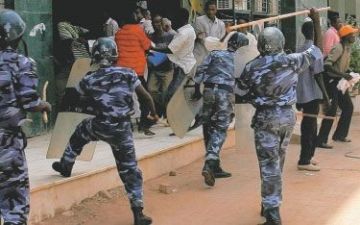Food price protests renew in Sudan’s capital
September 27, 2011 (KHARTOUM) – The Sudanese capital Khartoum on Tuesday witnessed renewed protests and concomitant police crackdown, as the country’s ruling party accused unnamed parties of standing behind the protesters.

Police forces moved in and dispersed the protestors using teargas, arresting some in the process.
Witnesses told AFP that around 150 people, mostly under 25, gathered between 7:30 and 8 pm on Tuesday in Burri district, clogging traffic and burning tyres in the main road as they shouted slogans calling for regime change and denouncing increases in prices.
The protestors clashed with police forces which used teargas to break them up.
The Sudanese ministry of interior released a press statement saying that police forces fired teargas on the protestors after they threw stones at the police.
Sources told Sudan Tribune that agents of the country’s national Intelligence and Security Services (NISS) deployed in Burri and conducted a campaign of arrests among the protesting youth.
The NISS also suspended the publication of the independent daily Al-Jaridah and confiscated its assets without giving any reasons.
Al-Jaridah was subject to several instances of confiscation in the last few days. The NISS also ordered newspapers to refrain from publishing reports of the protests.
Meanwhile, a spokesman for the ruling National Congress Party accused unnamed parties of mobilizing the protestors.
The Sudanese government has largely escaped the wave of popular revolts which swept through the Middle East and toppled authoritarian regimes in Tunisia and neighboring Egypt and Libya.
Sudan’s economic situation has been at a tense point due to rising inflation, weakening currency and loss of oil revenues as a result of South Sudan’s secession.
(ST)
